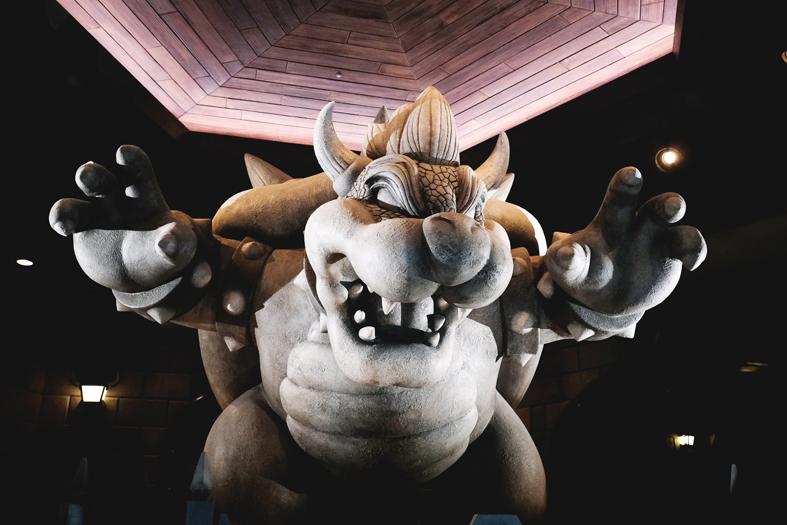The opening of the first-ever Super Mario theme park has been delayed again as Japan battles a surge in COVID-19 cases, Universal Studios Japan said yesterday.
Nintendo Co’s long-awaited foray into amusement parks was originally set to open in July last year ahead of the Tokyo Olympic Games. Like the Games, its launch was delayed by the COVID-19 pandemic, with a new date set for Feb. 4.
Featuring a real-life Bowser’s Castle and an interactive Mario Kart ride, the attraction, part of the existing Universal Studio’s theme park in the western city of Osaka, had been expected to draw huge crowds.

Photo: Bloomberg
After the Japanese government this week extended a COVID-19 state of emergency to Osaka to stem a surge in cases, the company decided to postpone the opening for the second time.
“We sincerely apologize for the trouble caused to guests ... who were looking forward to the opening. The opening date will be decided and announced after the state of emergency is lifted,” the company said.
While Japan’s outbreak remains comparatively small, health experts say that hospitals are under heavy strain in the worst-affected areas.
The emergency declaration, in place in 11 of the country’s 47 prefectures, lasts until Feb. 7.
It asks restaurants and bars to close early, with residents urged to avoid unnecessary outings and working from home strongly encouraged.

China has claimed a breakthrough in developing homegrown chipmaking equipment, an important step in overcoming US sanctions designed to thwart Beijing’s semiconductor goals. State-linked organizations are advised to use a new laser-based immersion lithography machine with a resolution of 65 nanometers or better, the Chinese Ministry of Industry and Information Technology (MIIT) said in an announcement this month. Although the note does not specify the supplier, the spec marks a significant step up from the previous most advanced indigenous equipment — developed by Shanghai Micro Electronics Equipment Group Co (SMEE, 上海微電子) — which stood at about 90 nanometers. MIIT’s claimed advances last

Taiwan Semiconductor Manufacturing Co (TSMC, 台積電) has appointed Rose Castanares, executive vice president of TSMC Arizona, as president of the subsidiary, which is responsible for carrying out massive investments by the Taiwanese tech giant in the US state, the company said in a statement yesterday. Castanares will succeed Brian Harrison as president of the Arizona subsidiary on Oct. 1 after the incumbent president steps down from the position with a transfer to the Arizona CEO office to serve as an advisor to TSMC Arizona’s chairman, the statement said. According to TSMC, Harrison is scheduled to retire on Dec. 31. Castanares joined TSMC in

EUROPE ON HOLD: Among a flurry of announcements, Intel said it would postpone new factories in Germany and Poland, but remains committed to its US expansion Intel Corp chief executive officer Pat Gelsinger has landed Amazon.com Inc’s Amazon Web Services (AWS) as a customer for the company’s manufacturing business, potentially bringing work to new plants under construction in the US and boosting his efforts to turn around the embattled chipmaker. Intel and AWS are to coinvest in a custom semiconductor for artificial intelligence computing — what is known as a fabric chip — in a “multiyear, multibillion-dollar framework,” Intel said in a statement on Monday. The work would rely on Intel’s 18A process, an advanced chipmaking technology. Intel shares rose more than 8 percent in late trading after the

FACTORY SHIFT: While Taiwan produces most of the world’s AI servers, firms are under pressure to move manufacturing amid geopolitical tensions Lenovo Group Ltd (聯想) started building artificial intelligence (AI) servers in India’s south, the latest boon for the rapidly growing country’s push to become a high-tech powerhouse. The company yesterday said it has started making the large, powerful computers in Pondicherry, southeastern India, moving beyond products such as laptops and smartphones. The Chinese company would also build out its facilities in the Bangalore region, including a research lab with a focus on AI. Lenovo’s plans mark another win for Indian Prime Minister Narendra Modi, who tries to attract more technology investment into the country. While India’s tense relationship with China has suffered setbacks